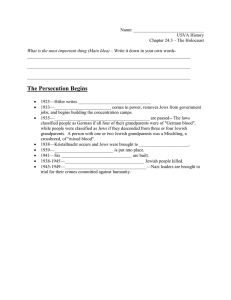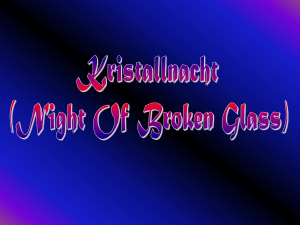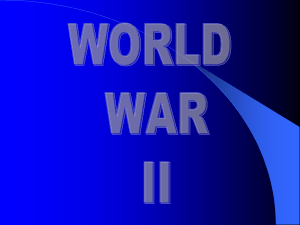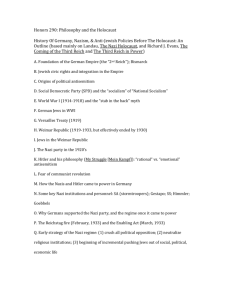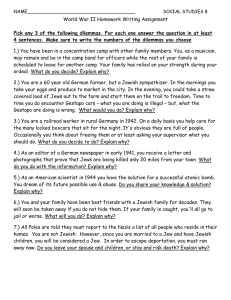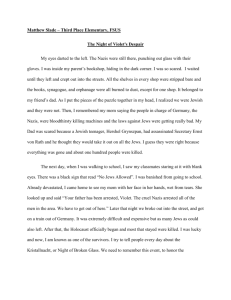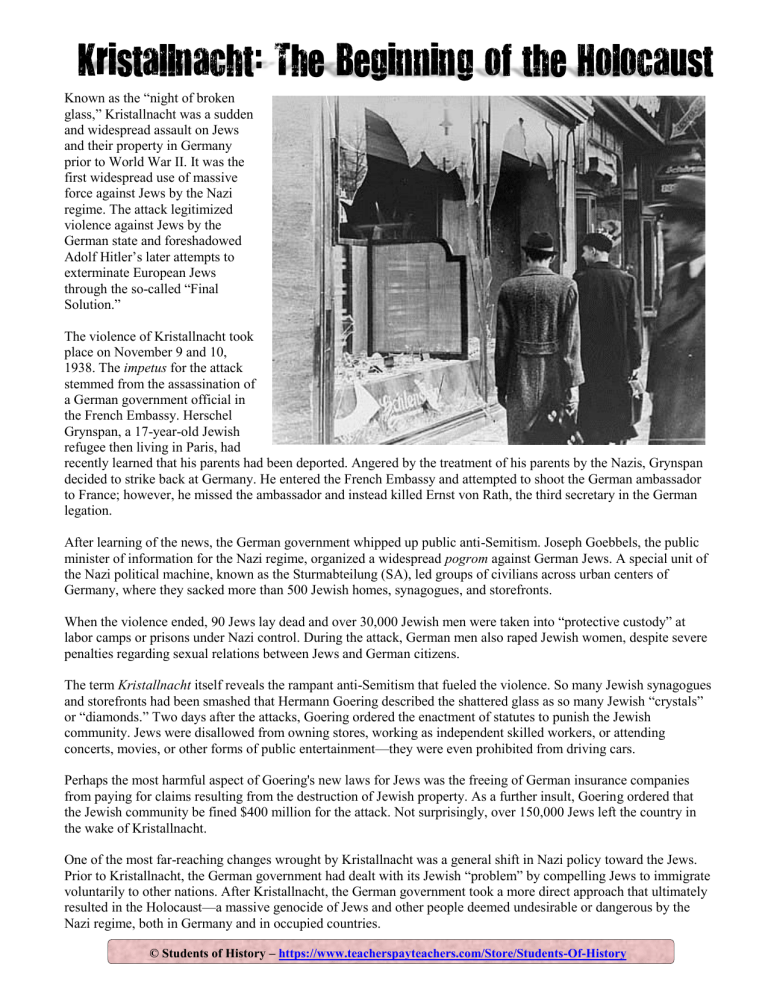
Kristallnacht: The Beginning of the Holocaust Known as the “night of broken glass,” Kristallnacht was a sudden and widespread assault on Jews and their property in Germany prior to World War II. It was the first widespread use of massive force against Jews by the Nazi regime. The attack legitimized violence against Jews by the German state and foreshadowed Adolf Hitler’s later attempts to exterminate European Jews through the so-called “Final Solution.” The violence of Kristallnacht took place on November 9 and 10, 1938. The impetus for the attack stemmed from the assassination of a German government official in the French Embassy. Herschel Grynspan, a 17-year-old Jewish refugee then living in Paris, had recently learned that his parents had been deported. Angered by the treatment of his parents by the Nazis, Grynspan decided to strike back at Germany. He entered the French Embassy and attempted to shoot the German ambassador to France; however, he missed the ambassador and instead killed Ernst von Rath, the third secretary in the German legation. After learning of the news, the German government whipped up public anti-Semitism. Joseph Goebbels, the public minister of information for the Nazi regime, organized a widespread pogrom against German Jews. A special unit of the Nazi political machine, known as the Sturmabteilung (SA), led groups of civilians across urban centers of Germany, where they sacked more than 500 Jewish homes, synagogues, and storefronts. When the violence ended, 90 Jews lay dead and over 30,000 Jewish men were taken into “protective custody” at labor camps or prisons under Nazi control. During the attack, German men also raped Jewish women, despite severe penalties regarding sexual relations between Jews and German citizens. The term Kristallnacht itself reveals the rampant anti-Semitism that fueled the violence. So many Jewish synagogues and storefronts had been smashed that Hermann Goering described the shattered glass as so many Jewish “crystals” or “diamonds.” Two days after the attacks, Goering ordered the enactment of statutes to punish the Jewish community. Jews were disallowed from owning stores, working as independent skilled workers, or attending concerts, movies, or other forms of public entertainment—they were even prohibited from driving cars. Perhaps the most harmful aspect of Goering's new laws for Jews was the freeing of German insurance companies from paying for claims resulting from the destruction of Jewish property. As a further insult, Goering ordered that the Jewish community be fined $400 million for the attack. Not surprisingly, over 150,000 Jews left the country in the wake of Kristallnacht. One of the most far-reaching changes wrought by Kristallnacht was a general shift in Nazi policy toward the Jews. Prior to Kristallnacht, the German government had dealt with its Jewish “problem” by compelling Jews to immigrate voluntarily to other nations. After Kristallnacht, the German government took a more direct approach that ultimately resulted in the Holocaust—a massive genocide of Jews and other people deemed undesirable or dangerous by the Nazi regime, both in Germany and in occupied countries. © Students of History – https://www.teacherspayteachers.com/Store/Students-Of-History Name ______________________________________________ Kristallnacht: The Beginning of the Holocaust Directions: After reading the article, answer the following questions in complete sentences. 1. What details from the story support the idea that Kristallnacht was the beginning of the Holocaust? 2. What is the best synonym for “impetus” in the second paragraph? a. End b. Reason c. News d. Violence 3. Based on the context clues, what is the best meaning of “pogrom” in the 3rd paragraph? a. Laws passed to limit the rights of a religious or ethnic group. b. Police group organized to prevent violence in a region. c. Mass exodus of a group from a region due to violence. d. Coordinated acts violence against a religious or ethnic group. 4. How did Herman Goering contribute to the event being named “Kristallnacht”? 5. How did the new statutes or laws Goering ordered further hurt the Jewish community? 6. Evaluate whether this sentence is fact or opinion and explain your reasoning: “Perhaps the most harmful aspect of Goering's new laws for Jews was the freeing of German insurance companies from paying for claims resulting from the destruction of Jewish property.” 7. How do you think other countries reacted to news of Kristallnacht? What actions could they have taken? Name _______Answer Key/Teacher’s Guide_______ Kristallnacht: The Beginning of the Holocaust Directions: After reading the article, answer the following questions in complete sentences. 8. What details from the story support the idea that Kristallnacht was the beginning of the Holocaust? Kristallnacht was the first open act of violence by the Nazi government against Jews. It was also the first widespread use of massive force 9. What is the best synonym for “impetus” in the second paragraph? a. End b. Reason c. News d. Violence 10. Based on the context clues, what is the best meaning of “pogrom” in the 3rd paragraph? a. Laws passed to limit the rights of a religious or ethnic group. b. Police group organized to prevent violence in a region. c. Mass exodus of a group from a region due to violence. d. Coordinated acts violence against a religious or ethnic group. 11. How did Herman Goering contribute to the event being named “Kristallnacht”? Hermann Goering was referring to the countless Jewish synagogues and storefronts that had been smashed that as so many Jewish “crystals” or “diamonds” being broken. 12. How did the new statutes or laws Goering ordered further hurt the Jewish community? The laws allowed German insurance companies to not have to pay claims resulting from the destruction of Jewish property. The Jewish community was also fined $400 million for the attack. 13. Evaluate whether this sentence is fact or opinion and explain your reasoning: “Perhaps the most harmful aspect of Goering's new laws for Jews was the freeing of German insurance companies from paying for claims resulting from the destruction of Jewish property.” The sentence is more of an opinion because some could argue that other aspects of the laws were more harmful than the insurance claims issue. 14. How do you think other countries reacted to news of Kristallnacht? What actions could they have taken? Open to many different student answers provided they support their answer. Options might include sanctions, trade restrictions, and international pressure from the League of Nations. © Students of History – https://www.teacherspayteachers.com/Store/Students-Of-History
